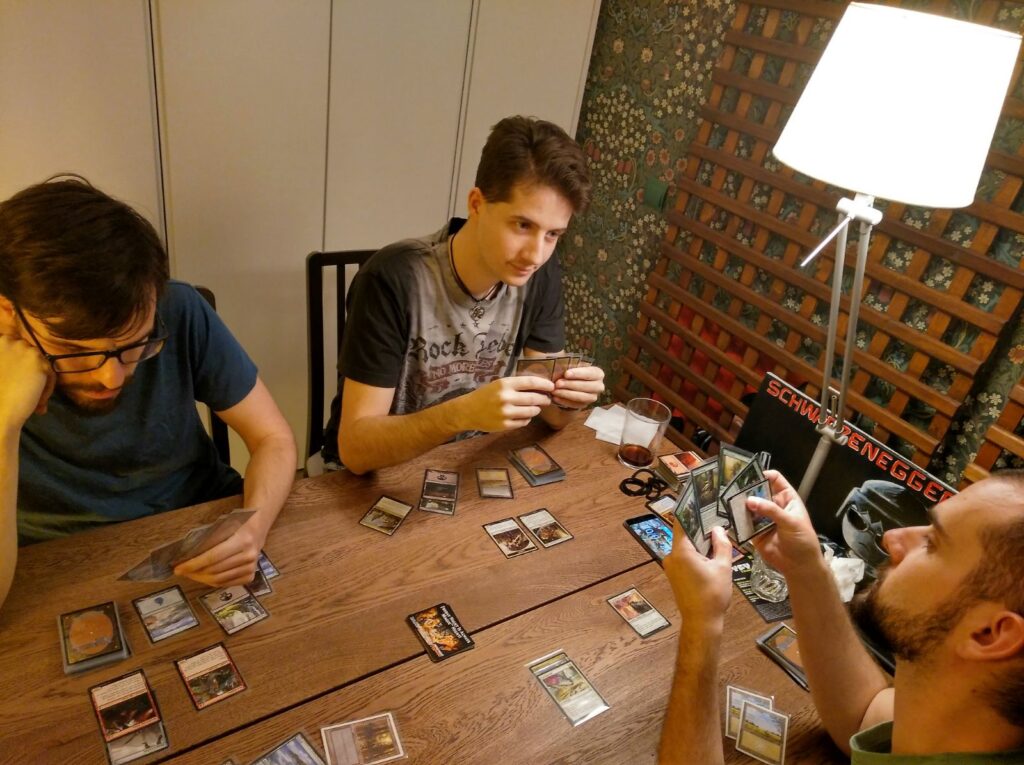At some point in your life, you may have come across Magic: The Gathering. The wildly popular phenomenon that pioneered the idea of TCGs (trading card games), has existed for over 30 years now. Over those decades, Magic has gone through many changes, and is a very different game than when it was released. Most of these changes were drastic improvements, the introduction of multiple structured formats and their respective ban lists helped the game flourish, but some unfortunate changes are affecting the game’s health.
Magic first hit the shelves in 1993 and was an immediate success. It was the first of its kind, a game where instead of having a premade deck that all players were restricted to, everyone had the ability to create, fine tune and personalize their own deck of at least 60 cards.
Its premise also appealed to players. The game puts you in the shoes of an interdimensional spellcaster known as a “planeswalker,” locked in a deadly battle with another of your kind. Your battle will involve summoning monsters known as “creatures,” and harnessing the power of magical spells. Goblins, dragons, wizards and ancient artifacts are all at your disposal as you traverse the dimensions in an epic fight.
Thousands of people were drawn to the creativity Magic exhibited. As it grew through word of mouth, people were immediately drawn to the creativity such a system allowed, and dove headfirst into the mechanics of the game.
In Magic, cards are separated into five colors– each with their own themes and mechanics to explore. Black is the color of power, sacrifice, death, and progress, while blue is the color of knowledge, deceit, caution and perfection. There was something for everyone within at least one of the colors, thus hundreds of thousands devoted their time to Magic. There was only one question to ask: When would it die down?
It didn’t. From 2008 to 2016, Magic saw the largest spike in popularity in its history, printing over 20 billion cards in eight years. Game stores devoted solely to Magic cropped up around the country, and in 2018 Wizards Of The Coast (the company behind Magic) announced a free to play online game. Business was booming, and still is to this day.
However, The catch lies in the game’s huge monetary success. Magic products are separated into “sets” of cards, released at the same time and flooding the competitive field. Standard, a popular format that restricts players to cards from the six most recent sets, usually sees a huge shift in deck strategies and themes after a new set releases.
Gradually over the past decade, the amount of product released by Wizards Of The Coast has increased from two, to four, and now six main sets a year. This does not include digital releases, commander sets, secret lair drops, non-booster products or joke sets. As the company grows so does the Magic brand, as the directing team scrambles to keep up, printing 25 individual products in 2022.
This new product would be wonderful if it was high quality, but recent sets have shown unfortunate results. Each set takes the players to a different plane of existence, each with its own theme. I first noticed a shift in the game when The Brothers War set was released in 2023, a return to the fan favorite plane of Dominaria. It followed the huge success that was Kamigawa Neon Dynasty and the decent Streets Of New Capenna.
There was a notable difference in how much attention was given to certain cards and mechanics. The set had what’s called a “high curve,” meaning the average cost of in-game resources needed to play cards was much higher than usual. Cards in Magic can’t be played for no cost, players need to spend “mana.” Mana is gained through “lands,” which are key parts of a deck. Finding the perfect balance between non-land cards that give you value and lands that allow you to play those cards is important for any deck builder.
A high-curve set meant players had to spend more of their 60 card slots on lands, meaning less fun cards. Paired with an increase in cards that kill your opponents cards- and huge tough-to-kill creatures made for incredibly slow and boring gameplay.
Specific cards dominated the set, while others were ignored. These eye-catchers that tended to be very valuable, served the purpose of hooking people on the set and incentivizing them to buy more products. Huge focus was put on Urza and Mishra, two prominent figures in the lore of Magic. Their respective cards, Urza, Lord Protector and Mishra, Claimed By Gix, outclassed others by a mile with beefy stats worth more than their costs, and complex and powerful abilities.
The balance of mechanics showed no thought whatsoever, leaving some unplayable and others overpowered. The introduction of “powerstones” was a thematically rich idea, but was overshadowed by mechanics like “unearth” and “prototype,” each giving players a way to either play their cards for less mana with a slight disadvantage, or cheat it into play from the discard pile, both incredibly powerful abilities.
Creativity was thrown out of the window, focus aimed more at how they could effectively monetize the set. The status of “legendary creature” was in the past reserved for important cards with rich lore behind them.These characters had thought out personalities and themes with extensive stories behind them. Almost 50 were printed in The Brothers War, each an “original” character with seemingly no backstory or other relevance.
These issues continue past early this year. Since then, Wizards Of The Coast has released their official release schedule for 2024, previewing at least eight sets. Partnerships with Marvel and yu-gi-oh have been confirmed as the company attempts to exponentially raise their popularity.
The air surrounding the game recently has seemed grossly capitalistic and dishonest. aid partnerships, a decrease in game quality and poor communication with the consumer all points to the sick corporatization overtaking the company and sabotaging the game’s magic as they grow in popularity. We see this all around us today, in Disney movies for example. A studio once respected and hailed as a symbol of joy and education for children, has received massive backlash as they have begun to pump out B-list movies one after another. The charm is gone, and that’s the only thing I wish to not happen to Magic.
I have played this game for eight years– over half of my life. I care about this game, and that is why it pains me to see it fall victim to the hands of a company inching towards a cash-grab scheme that ruins the integrity of the game.
The game has acquired a rich community that is almost always open to changes. Wizards Of The Coast has repeatedly decided to abuse that trust with its fanbase, leading to a huge drop in popularity over the past year, especially in its online form. It saddens me to think about this part of my life falling prey to a plot that undermines the integrity of the game, but at least part of me is hopeful. I still love this game, and hope Wizards Of The Coast realizes the poor reception that they have earned cannot be fixed by another endorsed partnership.
Photo: “A group of players during a Magic The Gathering draft” by GatitaCelosa69 is licensed under CC BY-SA 4.0





Leave a Reply